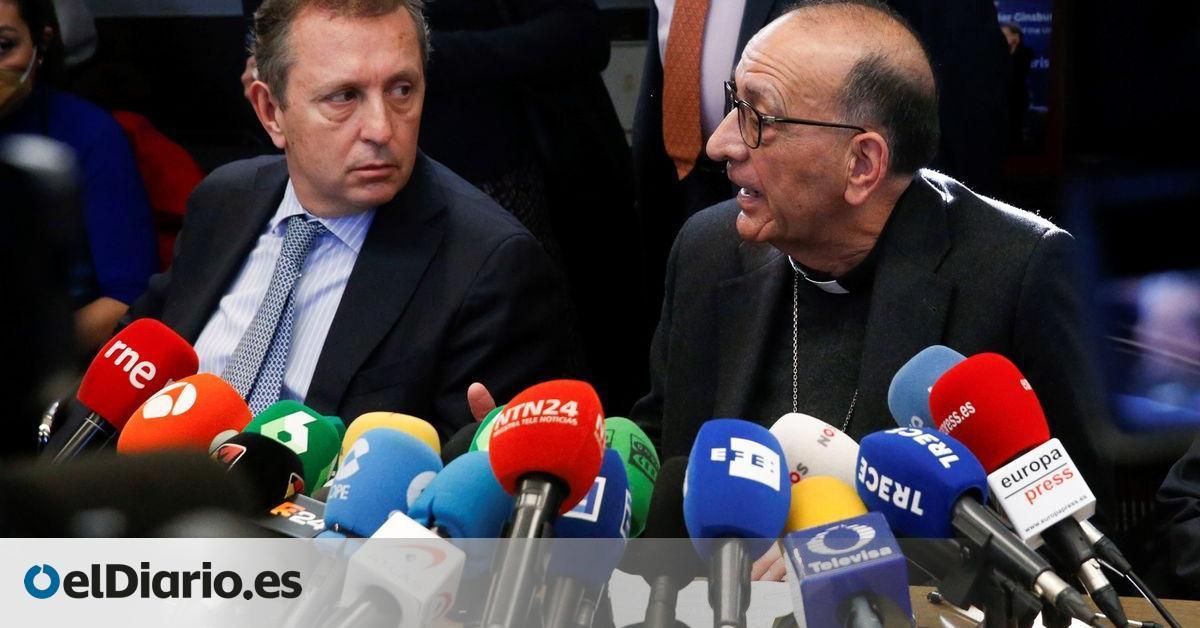
Some 4,000 victims. This is the figure that is handled, with great caution, in the context of the audit commissioned, a year ago now, by the Spanish Episcopal Conference to the firm Cremades & Calvo Sotelo to try to unravel, from within, the drama of the sexual abuse of minors in the Spanish Church. And to offer, as the bishops announced in their day, recommendations that in no case will be mandatory.
Javier Cremades, in charge of the audit on abuses in the Church: “Our goal is not to talk to the victims”
Further
According to what elDiario.es has been able to learn, the first data from this investigation – Congress commissioned another independent one from the Ombudsman – point to a figure (necessarily conservative, as it is a party audit) of around 4,000 victims, eight times more of those recognized up to now by the Episcopal Conference and a much higher figure than that presented by different journalistic inquiries. The firm’s work has focused in recent months, on the one hand, on talking to victims, which has resulted in some 120 interviews so far. On the other hand, there is a review of the ecclesiastical archives in order to draw up a map of what has happened in the last 60 or 70 years. As in Portugal, the limit, somewhat diffuse, is placed around the decade of the 50s.
Even with the surprising number for what has been the discourse of the Episcopal Conference so far, there are those who think that it may be too conservative. It is close to the one that an investigation awarded only to the Archdiocese of Munich (Germany), which spoke of 3,600 victims. This same Monday the Portuguese Church presented its own report in which it points to almost 5,000 affected in a country much smaller than Spain. The truth is that people who have participated in these two reports are working with the Cremades team in the preparation of Spanish.
Report delivery delay
The audit, contracted last year around these dates -in principle pro bono, although the Church is paying the costs derived from external contracting and travel, with amounts that have not been publicly detailed – had an estimated completion period of 12 months, as announced by elDiario.es when publishing the contract between both entities but it won’t be on time. The report will not be delivered, as planned, next week, and the most optimistic forecasts point to spring (May-June), although it is most likely that the final report will not be presented until after the summer.
What are the causes of the delay? In the first place, the slowness – and, in some cases, the “contempt” – of some bishoprics when collaborating with the audit, as well as the difficulties in accessing confidential data, as pointed out by sources close to the study. The departure of Luis Argüello from the General Secretariat of the Episcopal Conference has not helped much in accelerating some work in which the “intense” collaboration of the entire episcopate is lacking.
Thus, loud differences are established between the actions of dioceses such as Madrid, which this Wednesday presented data from the Repara project, which attended 121 victims of abuse during 2022 (around half were religious or priests) and five perpetrators (three of them clergymen); or, at the other extreme, Valladolid, which continues to claim that it has not found any cases (despite the fact that, as pointed out by The Independent, Cardinal Blázquez could have relocated a priest knowing that he had maintained “reprehensible” behaviors with a minor in his previous destination).
Collaboration with religious congregations, on the other hand, is proving more open, and researchers have admitted that many religious orders already had “a good deal of the work done” before they arrived, contrasting with the situation in at least a dozen of dioceses, where anti-abuse offices do not exist in practice.
A representative of the audit recently traveled to Rome to report on the progress (and delays) of the study, and to compare it with other similar experiences, such as the Italian, the French, the German and, now, the Portuguese. The second objective of the audit is to prepare a manual of good practices and prevention and, finally, to propose a series of recommendations for action for ecclesiastical leaders in which they will propose economic compensation, beyond the payment of treatments. In any case, it is not a mandatory report and the authorities of the Spanish Church have not been very favorable to compensation.
secret agreements
Some preliminary data, as reported by elDiario.es, have also revealed the existence of dozens of out-of-court agreements signed between defendants and victims of pedophilia. The team in charge of the audit commissioned by the Episcopal Conference has detected “around thirty” documents that “waive the courts” in cases of sexual assault.
Some have been revealed by this means, such as the compensation to the victim of the ‘Cocina case’, an Opus Dei priest who ‘bought’ the silence of a victim for 17,000 euros. The agreement implied the resignation of the victim “to any actions that may correspond” against the priest, Opus Dei or the Church, and prohibited him from ruling on the pact.
At the same time, some ecclesiastical institutions are raising funds to be able to face the hypothetical payment of compensation, since most of the admitted cases are prescribed by civil law. All in all, the biggest problem that the audit will surely find will be in its reading by an episcopate that, unlike the Portuguese, continues to seem more reluctant to accept its responsibility, based on its constant references to the percentage of abuses that occur in Church and in the rest of society, in addition to the attitude towards other investigations (fundamentally, that of the Ombudsman), with which they are not actively collaborating.
After some hesitant beginnings, with the presence of prominent conservative ecclesiastics, the work of Pedro Precht, in charge of the report in Portugal and one of the most recognized experts in the fight against clerical pedophilia, has been gaining weight in the Cremades audit. His task, it seems, has led the report little by little to focus on providing clues for the present, and for the future, in the relationship with the victims. Another thing is what the bishops will do with the results: whether they will make a definitive commitment to the survivors of abuse or, on the contrary, continue to look the other way.
All information at www.religiondigital.org
Source: www.eldiario.es

